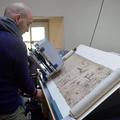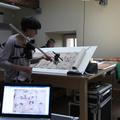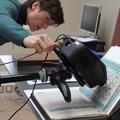Non-destructive analysis of early Mesoamerican manuscripts conservation project
Project dates
Completed in 2016
Project summary
The Bodleian Libraries’ Conservation and Collection Care team were awarded a grant from the Cultural Heritage Advanced Research Infrastructures, Synergy for a Multidisciplinary Approach to Conservation/Restoration (CHARISMA).
The grant enabled us to use a mobile laboratory for instrumental analysis (MOLAB) to characterise the colours present in the Libraries’ five pre-Hispanic and early colonial Mexican pictorial manuscripts. These were: Codex Laud, Codex Bodley, Codex Selden, the Roll of the New Fire (previously known as the Selden Roll), and Codex Mendoza.
These are unique treasures amongst a group of sixteen ancient codices that survived the colonisation of America.
Project goals
Due to the fragility of the codices, very little work had been done in the past to assess their materials and composition. Yet it is these very aspects that are critical to understanding the nature of these documents, their construction and their durability. The outcomes of the project were:
- Learning more about the pictorial techniques and characterising the materials used in these five manuscripts;
- Answering key questions concerning both the history and making of these codices;
- Minimising the unnecessary handling and piecemeal analysis of these unique items.
Methodology
The project involved the non-destructive chemical characterization of pigments and colorants used in the manuscripts’ manufacture. This allowed us to clarify the ancient Mesoamerican painting techniques and to compare the scientific results with those proceeding from similar analysis carried on in recent years on other Mesoamerican codices by the MOLAB. The MOLAB campaign was conducted thoroughly over five days working on each codex at the same time. The investigations involved different spectroscopic techniques:
- XRF – for the identification of preparation layers, pigments and possibly organic pigments/colorants and the supports/substrates for these colorants (with Raman and FTIR);
- FT-IR (mid and near) – for pigment, binder and support identification (and possibly to assess any conservation interventions), preparatory layers, identification of clay substrate types, investigation of areas of repair (with Raman and XRF);
- Raman – pigment and dyes (especially to look for possible indigoid-based pigments/colorants including shellfish purple and Maya blue) (with XRF and FTIR);
- Fiber-optic vis-NIR spectroscopy, fiber-optic UV-vis fluorescence and fluorescence time decay – identification of presence/location of organic substances and possibly identification of the substances/colorants used.
The non-invasive investigations were completed by imaging analyses such as UV fluorescence imaging and digital microscopy. This allowed us to obtain general information about the distribution of the fluorescent materials and indications on possible mixture of pigments/colorants and material consistency of the painting layers.
Conference
The Bodleian Libraries organised the international conference Mesoamerican manuscripts: scientific approaches and interpretations, which took place from 31 May to 2 June 2016.
The conference brought together findings from a panel of scholars and experts in Mesoamerican studies on the making and historical significance of the Bodleian Libraries' and other early, pictorial Mesoamerican manuscripts. It situated them in the context of the pre-Columbian and colonial societies that produced them, described the world they depict, and reflected upon their meaning in contemporary Mexico and beyond.
Watch the session recordings from the conference
After the conference, Prof. Marrten Jansen, Virginia Llado-Buisan and Ludo Snijders published the book “Mesoamerican Manuscripts: New Scientific Approaches and Interpretations”, (Brill)
The conference was partially sponsored by:
- the European Research Council (ERC) through its Advanced Grant (No 295434) for the project 'Time in Intercultural Context: the Indigenous Calendars of Mexico and Guatemala';
- the Netherlands Foundation for Scientific Research (NWO) through its support for the project 'Shedding light on endangered mutual heritage'.












